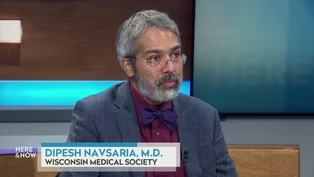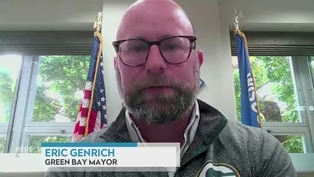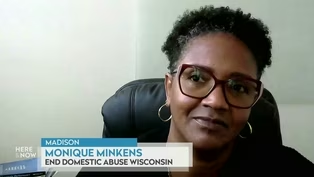Here and Now
Beth Swedeen on Federal Cuts to Special Education Funding
Clip: Season 2400 Episode 2415 | 6m 9sVideo has Closed Captions
Beth Swedeen on impacts of the U.S. Department of Education cuts on special education.
Wisconsin Board for People with Developmental Disabilities Executive Director Beth Swedeen considers impacts of U.S. Department of Education funding cuts and layoffs on special education in the state.
Problems playing video? | Closed Captioning Feedback
Problems playing video? | Closed Captioning Feedback
Here and Now is a local public television program presented by PBS Wisconsin
Here and Now
Beth Swedeen on Federal Cuts to Special Education Funding
Clip: Season 2400 Episode 2415 | 6m 9sVideo has Closed Captions
Wisconsin Board for People with Developmental Disabilities Executive Director Beth Swedeen considers impacts of U.S. Department of Education funding cuts and layoffs on special education in the state.
Problems playing video? | Closed Captioning Feedback
How to Watch Here and Now
Here and Now is available to stream on pbs.org and the free PBS App, available on iPhone, Apple TV, Android TV, Android smartphones, Amazon Fire TV, Amazon Fire Tablet, Roku, Samsung Smart TV, and Vizio.
Providing Support for PBS.org
Learn Moreabout PBS online sponsorshipproducers and stores.
>> Dipesh Navsaria, thanks very much.
>> Thanks for having me.
>> There's more fallout from federal cuts and layoffs for Wisconsin, this time with cuts to the U.S.
Department of Education.
In the midst of the government shutdown, the Trump administration laid off more than 450 employees in the department, nearly all of them in the office that oversees special education requirements for states.
While a federal judge temporarily paused the mass layoffs, deep concerns remain, including for Beth Swedeen, executive director of the Wisconsin Board for people with Developmental Disabilities.
And thanks a lot for being here.
>> Thank you.
>> So a federal judge, midweek, as we just said, temporarily halted mass layoffs in federal agencies.
to the consequence relating to special education in Wisconsin?
concerned because, as you know, everybody is off anyway, with the government being shut down.
And we just don't know what those people will come back in a timely way.
And then, of course, when you don't know if your job is secure, we are assuming a lot of those people might be going elsewhere anyway.
So there's always a concern when there's this kind of threat that you don't bounce back from it very quickly.
employees stand, what would the staff cuts in the Office of Special Education and Rehabilitative Services mean for children here in the classroom?
>> We think that almost all of the positions were cut with the exception of a handful.
So from several hundred down to, you know, under ten.
So those are the folks who, when a family can't get redressed in the state, or if a school district has a question about interpretation of the law, that's where they went.
And so that means that even though we have this federal statute in place, this federal law that's 50 years old this year, there's nothing to enforce it if those cuts go through.
>> So this law, the Disabilities Education Act or Idea, guarantees public special education services to nearly 130,000 students in Wisconsin.
What was it like for students with disabilities before the federal law was passed in 1975?
>> Well, those students weren't students.
So before 1975, if you had a significant disability or developmental disability, but like a physical disability, a school district did not have to serve you.
So we know almost all students were either at home with their families or unfortunately in institutions because medical doctors were saying there's really nothing, no future for your child.
Why don't you just go to a state institution or they around 50, 60 years ago, some families with a little more vision and kind of a can do attitude did start their own schools, often in church basements, but there were no protections in place.
And students who really had so much potential never saw that because they couldn't even enter the door of a school.
>> Because students with special needs can learn and can be educated and can succeed.
as you know, as a disability community, we have seen that happen.
We have seen even students with the most significant disabilities, with the right supports, with the right services, and now with oftentimes the right technology, they can be successful, they can work in the community, they can live either semi-independently or with some support, living out in the community.
And they can have very fulfilling lives.
>> So if the US Department of Education more generally wants states to take over these and other services, what's on the horizon for special education?
>> Well, the dismantling came first, and the idea of sending those dollars and the responsibility to the states has yet to materialize.
So we don't really know what the future is.
Usually when you want to reform something, you look at it carefully to see where the flaws are, and then you develop a plan and supports for implementing the changes.
That has not happened in this situation.
The cuts have come first and then some lip service toward maybe states can take over, but we really don't know what that looks like.
And as you probably know, that could take years to sort of switch that over.
And I think what's important with idea with this federal law is it's a federal law.
So the feds are the ones who need to enforce the law.
States oftentimes have had issues where they have not that's when the feds have come in and said, no state, you're not doing it correctly.
We're going to give you, you know, guidance on how you need to change things.
Department of Education cut would eliminate about $8 million of a grant to Wisconsin to attract and retain special education teachers.
What's your reaction to that?
>> Well, we've seen several different cuts.
That's one that you're referring to, something that really prepares special education teachers and encourages them to go into the field and stay in the field.
There was also a program for deaf blind students that was cut.
So we see this as continuous attacks on students with disabilities and the supports and services they need to be successful.
>> And so where does this leave students and families?
>> Well, I was not the first one to hear about this.
There was a ripple across the state over the weekend on social media and elsewhere from families.
Families were the ones who heard the news first, and they're really concerned.
I mean, they're as you mentioned, we already have significant problems with getting enough special education teachers.
There's a lot of teachers on emergency licenses right now, and school districts are having a hard time with budgets, providing the full array of services that students need and that are in their plans.
So this is not this is something that we're really concerned about moving forward, that that there will not be any enforcement and that enforcement and that
Dr. Dipesh Navsaria on Food Insecurity and Children's Health
Clip: S2400 Ep2415 | 5m 19s | Dipesh Navsaria on impacts of food assistance on nutrition and mental health of children. (5m 19s)
Here & Now opening for October 17, 2025
Video has Closed Captions
Clip: S2400 Ep2415 | 1m 9s | The introduction to the October 17, 2025 episode of Here & Now. (1m 9s)
Mayor Eric Genrich on The Green Bay Housing Partnership
Video has Closed Captions
Clip: S2400 Ep2415 | 7m 26s | Eric Genrich on lowering barriers to owning a home by leasing land to reduce mortgages. (7m 26s)
Monique Minkens on Domestic Violence Homicides in Wisconsin
Video has Closed Captions
Clip: S2400 Ep2415 | 16m 23s | Monique Minkens on Wisconsin's record number of domestic violence-related homicides. (16m 23s)
Providing Support for PBS.org
Learn Moreabout PBS online sponsorship
- News and Public Affairs

Top journalists deliver compelling original analysis of the hour's headlines.

- News and Public Affairs

FRONTLINE is investigative journalism that questions, explains and changes our world.












Support for PBS provided by:
Here and Now is a local public television program presented by PBS Wisconsin



